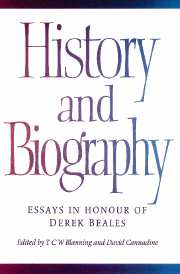Book contents
- Frontmatter
- Contents
- Notes on contributors
- Introduction: Derek Beales as historian and biographer
- 1 Baron Bartenstein on Count Haugwitz's ‘new System’ of government
- 2 The rise of the first minister in eighteenth-century Europe
- 3 An old but new biography of Leopold II
- 4 John Marsh's History of My Private Life 1752–1828
- 5 The gallows and Mr Peel
- 6 Széchenyi and Austria
- 7 Past and future in the later career of Lord John Russell
- 8 Documentary falsification and Italian biography
- 9 Kaiser Wilhelm II and the British monarchy
- 10 The historical Keynes and the history of Keynesianism
- 11 Bastianini and the weakening of the Fascist will to fight the Second World War
- 12 The New Deal without FDR: what biographies of Roosevelt cannot tell us
- History and biography: an inaugural lecture
- Derek Beales: a chronological list of publications
- Index
History and biography: an inaugural lecture
Published online by Cambridge University Press: 10 December 2009
- Frontmatter
- Contents
- Notes on contributors
- Introduction: Derek Beales as historian and biographer
- 1 Baron Bartenstein on Count Haugwitz's ‘new System’ of government
- 2 The rise of the first minister in eighteenth-century Europe
- 3 An old but new biography of Leopold II
- 4 John Marsh's History of My Private Life 1752–1828
- 5 The gallows and Mr Peel
- 6 Széchenyi and Austria
- 7 Past and future in the later career of Lord John Russell
- 8 Documentary falsification and Italian biography
- 9 Kaiser Wilhelm II and the British monarchy
- 10 The historical Keynes and the history of Keynesianism
- 11 Bastianini and the weakening of the Fascist will to fight the Second World War
- 12 The New Deal without FDR: what biographies of Roosevelt cannot tell us
- History and biography: an inaugural lecture
- Derek Beales: a chronological list of publications
- Index
Summary
Mr Vice-Chancellor,
Mr Gladstone, who will play a large role in this lecture, wrote in his diary, while he was an undergraduate at Christ Church: ‘I wish I were duly convinced of the extreme importance of residence at Oxford.’ This University's dispiriting notice to a new professor explains that he need not give an inaugural lecture ‘in his first term or in his first year’, or at all. On such a time-scale it cannot be too late to applaud the readiness of another Christ Church man to leave Oxford, even at the cost of coming to Cambridge, albeit under an assumed name, Lord Dacre of Glanton. Historians ought not to quote out of context, and so I continue Gladstone's diary entry: ‘I wish’, he said, ‘I were duly convinced of the extreme importance of residence at Oxford, both as regards individual progress in religion, and influence exercised directly or indirectly on others’ – and then, as so often, he spoils it all by a qualification – ‘especially in a case where the individual has the reputation of possessing more [influence] than he actually has’. In my opinion all the electors to the Chair of Modern History wield an influence as powerful as it is beneficent; and no member of this formidable audience contributes more to my sense of inadequacy as I speak than Lord Dacre, who has furnished in his own inaugural and valedictory lectures incomparable models of the blend of wit, style and wisdom appropriate to such occasions.
- Type
- Chapter
- Information
- History and BiographyEssays in Honour of Derek Beales, pp. 266 - 283Publisher: Cambridge University PressPrint publication year: 1996
- 1
- Cited by

